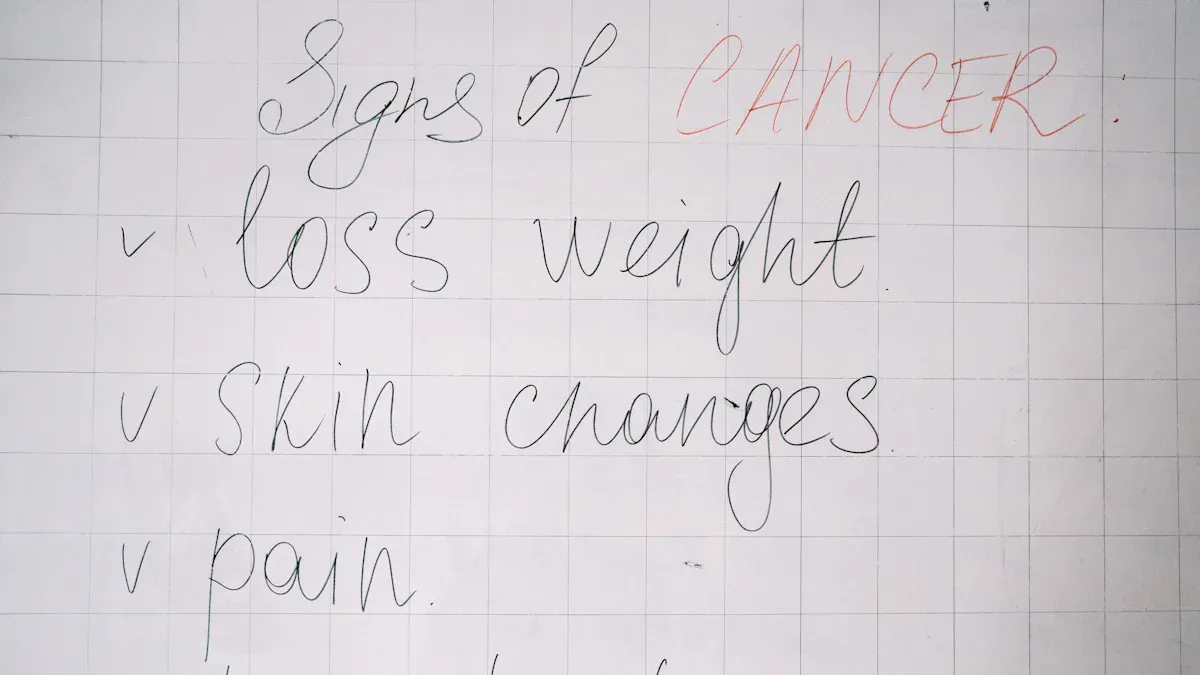Why Does Cancer Cause Weight Loss

Cancer often leads to weight loss due to changes in your body’s metabolism, appetite, and energy needs. Tumors can disrupt how your body processes energy, causing rapid fat and muscle loss. Appetite loss, or anorexia, affects 15% to 25% of cancer patients at diagnosis and may worsen with treatment. Severe malnutrition can result in over 10% weight loss within six months. These changes make managing weight loss essential for improving your health and quality of life. Does Cancer Always Cause Weight Loss? How Treatment Affects the Body depends on various factors, including the type of cancer and its treatment.
Key Takeaways
Cancer changes how the body uses energy, causing weight loss. It can also make people lose their appetite.
Cancer cachexia is a condition where muscles and fat shrink. This can affect recovery and survival chances.
Feeling anxious or sad can make eating harder. It's important to care for both the body and mind during treatment.
Eating the right foods early can help keep weight steady. It can also make treatments easier and life better.
Talk to your doctor for tips to manage weight loss. They can help make your treatment smoother.
The Mechanisms Behind Cancer-Related Weight Loss

Metabolic Changes
How cancer disrupts normal energy metabolism
Cancer alters how your body processes energy. Tumors release inflammatory proteins like tumor necrosis factor (TNF), which interfere with normal metabolism. These proteins increase your body's energy demands while suppressing your appetite. As a result, you may consume fewer calories than your body needs, leading to weight loss. This imbalance between energy intake and expenditure is a key factor in cancer-related weight loss.
The role of cancer cachexia in muscle and fat loss
Cancer cachexia is a syndrome that causes severe muscle and fat loss. It occurs in many cancer patients, especially those with advanced stages of the disease. Cachexia not only reduces your body weight but also weakens your muscles, making daily activities more challenging. Studies show that cachexia significantly impacts survival rates and treatment outcomes. For example, research highlights the connection between muscle wasting and poor clinical outcomes in cancer patients.
Appetite Loss
Tumor-related factors affecting hunger signals
Tumors can disrupt the signals that regulate your hunger. They release chemicals that suppress your appetite, making it difficult for you to eat enough food. This condition, known as anorexia, affects 15% to 25% of cancer patients at diagnosis. During chemotherapy, this number rises to 26%, as shown in outpatient clinic studies.
Emotional and psychological impacts on eating
Cancer can take an emotional toll, which often affects your eating habits. Anxiety, depression, and stress may reduce your desire to eat. You might also feel overwhelmed by the physical symptoms of cancer, such as nausea or fatigue, which further discourage you from maintaining a healthy diet.
Increased Energy Needs
How cancer raises the body's energy expenditure
Your body works harder when fighting cancer, which increases its energy needs. This heightened energy expenditure occurs even when you're resting. The extra energy required to combat the disease can lead to rapid weight loss, especially if you're not eating enough to meet these demands.
The role of inflammation in metabolic changes
Inflammation plays a major role in cancer-related weight loss. Tumors trigger inflammatory responses in your body, which disrupt normal metabolic processes. This inflammation not only increases energy expenditure but also contributes to muscle and fat breakdown. Addressing inflammation is crucial for managing weight loss and improving your overall health.
Tip: If you're experiencing weight loss due to cancer, consult your healthcare team to develop a personalized plan. Early intervention can help you maintain your strength and improve treatment outcomes.
Does Cancer Always Cause Weight Loss? How Treatment Affects the Body
Cancer-Related Factors
Inflammation and hormonal changes
Inflammation and hormonal changes play a significant role in cancer-related weight loss. Tumors release inflammatory proteins like tumor necrosis factor (TNF), which disrupt your body’s normal metabolic processes. These proteins can suppress your appetite and increase energy expenditure, leading to weight loss. Inflammation also affects albumin levels, which are often misinterpreted as indicators of poor nutrition. Hormonal changes further complicate this issue by altering your metabolism and reducing hunger signals.
Key impacts of inflammation and hormonal changes include:
Appetite suppression due to inflammatory proteins.
Altered metabolism, which accelerates weight loss.
Increased energy demands, even during rest.
The impact of cancer type on weight loss
Not all cancers cause weight loss to the same extent. Some types, like pancreatic cancer, are more likely to lead to significant weight loss. Advanced cancers and gastrointestinal cancers also commonly result in weight loss. The table below highlights the percentages of patients experiencing weight loss based on cancer type:
Cancer Type | Percentage of Patients Experiencing Weight Loss |
|---|---|
Pancreatic Cancer | |
Other Gastrointestinal Cancers | Fairly Common |
Advanced Cancers | More Likely |
Treatment-Related Factors
Side effects like nausea, vomiting, and mouth sores
Cancer treatments often cause side effects that make eating difficult. Chemotherapy and radiation can lead to painful mouth sores, nausea, and vomiting. These symptoms reduce your ability to consume enough calories, contributing to weight loss. The table below outlines common treatment-related side effects:
Treatment-Related Side Effects | Description |
|---|---|
Mouth and throat sores | Painful sores caused by chemotherapy and radiation, making it difficult to eat. |
Loss of appetite | Chemotherapy can affect appetite and taste, leading to reduced food intake. |
Diarrhea | Caused by various treatments, leading to unintended weight loss. |
Nausea and vomiting | Common side effects that can occur after treatment, affecting food intake. |
Fatigue and its effect on eating habits
Fatigue is another common side effect of cancer treatment. It reduces your energy levels, making it harder to prepare meals or eat regularly. This lack of energy often leads to skipped meals or smaller portions, further contributing to weight loss. Addressing fatigue through rest and nutritional support can help you maintain a healthier weight during treatment.
Note: If you experience these side effects, consult your healthcare team for strategies to manage them effectively.
Why Addressing Weight Loss Is Critical
Impact on Treatment Outcomes
How weight loss affects treatment tolerance
Weight loss can significantly impact how well you tolerate cancer treatments. Losing weight often weakens your body, making it harder to handle the side effects of chemotherapy or radiation. Studies show that patients who receive early nutritional support experience fewer treatment delays. For example:
Patients with nutritional intervention lost less weight during treatment (-4.6% vs -8.1%).
Fewer patients in the intervention group faced treatment delays due to toxicity (30.3% vs 63.6%).
Unplanned hospitalizations were also less common (16.1% vs 41.4%).
These findings highlight the importance of addressing weight loss early to improve your ability to complete treatment without interruptions.
The link between weight loss and survival rates
Weight loss can also affect your survival rates. Research shows that patients who maintain a stable weight during treatment tend to live longer. A study comparing survival rates found that weight-stable patients had a median survival of 8.6 months, while those losing weight had only 5.5 months.
Group | Median Survival (months) |
|---|---|
Weight-stable subjects | 8.6 |
Weight-losing subjects | 5.5 |
Maintaining your weight can improve your prognosis and help you achieve better outcomes during cancer treatment.
Effects on Quality of Life
Physical weakness and reduced energy
Weight loss often leads to muscle loss, which can make you feel physically weaker. This weakness reduces your energy levels, making daily tasks more challenging. You may find it harder to stay active or even complete basic activities like walking or cooking. Addressing weight loss can help you regain strength and improve your overall physical well-being.
Emotional and psychological toll of weight loss
The emotional impact of weight loss can be just as significant as the physical effects. Losing weight rapidly may leave you feeling anxious or depressed. You might also struggle with body image issues, which can lower your self-esteem. By managing weight loss, you can improve not only your physical health but also your emotional resilience during treatment.
Tip: Speak with a dietitian or healthcare provider to create a personalized plan for maintaining your weight. Early intervention can make a big difference in your treatment journey.
Managing and Preventing Weight Loss in Cancer

Nutritional Support
High-calorie, high-protein diets
A high-calorie, high-protein diet can help you combat weight loss during cancer treatment. These diets provide the extra energy and nutrients your body needs to maintain muscle mass and recover from treatment. Studies show that tailored dietary counseling can lead to better outcomes. For example:
Study | Intervention Group | Control Group | Weight Gain (kg) | Fat Mass Gain (kg) | P-value |
|---|---|---|---|---|---|
CRC-NORDIET | 192 patients, tailored dietary counseling | 191 patients, no intervention | 0.7 kg less | 0.6 kg less | P = .020, P = .019 |
This data highlights the importance of personalized nutrition plans in managing weight loss effectively.
Supplements and meal replacements
When eating regular meals becomes difficult, supplements and meal replacements can provide essential nutrients. Products like protein shakes or fortified drinks offer a convenient way to increase your calorie and protein intake. These options are especially helpful if you experience side effects like nausea or mouth sores that make eating solid foods challenging.
Medical Interventions
Appetite stimulants and medications
Appetite stimulants can help you regain your desire to eat. Medications like megestrol acetate have shown promise in improving appetite and promoting weight gain. Clinical trials also suggest that regular dietary support, such as weekly consultations with a dietitian, can lead to measurable improvements in weight and body composition.
Study Description | Intervention Group Results | Control Group Results | Statistical Significance |
|---|---|---|---|
383 patients with colorectal cancer | Weight gain of 0.7 kg and fat mass gain of 0.6 kg less than control group at 6 months | N/A | P = .020 and P = .019 |
Feeding tubes and advanced options
In severe cases, feeding tubes may become necessary to ensure you receive adequate nutrition. These interventions can prevent malnutrition and improve survival rates. A systematic review found that patients receiving tailored dietary counseling and advanced nutritional support experienced better overall survival compared to those without intervention.
Benefits of feeding tubes include:
Improved nutrient intake.
Stabilized weight during treatment.
Enhanced treatment tolerance.
Lifestyle Adjustments
Strategies to overcome appetite loss
You can take small steps to overcome appetite loss. Eating smaller, more frequent meals can make it easier to meet your calorie needs. Adding flavorful spices or sauces may also improve the taste of food, encouraging you to eat more.
Tips for making eating easier and enjoyable
Making meals enjoyable can help you maintain a healthy diet. Try eating with family or friends to create a positive atmosphere. Preparing easy-to-eat foods, like soups or smoothies, can also reduce the effort required to eat. These strategies can make a big difference in managing weight loss during cancer treatment.
Tip: Consult a dietitian to create a personalized plan that fits your needs and preferences. Early intervention can help you stay strong throughout your treatment.
Cancer-related weight loss involves a mix of metabolic, physical, and emotional factors. Addressing it early can improve your treatment outcomes and overall quality of life. A multidisciplinary approach, including nutritional support and medical interventions, has shown long-term benefits. For example:
Group | Fat Mass Gain (kg) | Fat Mass to Fat-Free Mass Ratio Increase | P-value | |
|---|---|---|---|---|
Intervention (n=192) | 0.7 | 0.6 | Lower increase at 6 months | 0.025 |
Control (n=191) | - | - | Higher increase at 6 months | 0.021 |
Collaborate with your healthcare team to create a personalized plan. Taking action now can help you stay strong during treatment.
FAQ
1. Can weight loss be the first sign of cancer?
Yes, unexplained weight loss can be an early sign of cancer. It often occurs in cancers like pancreatic, stomach, or lung cancer. If you notice sudden weight loss without changes in diet or activity, consult your doctor.
2. How much weight loss is considered significant in cancer?
Losing more than 5% of your body weight within six months without trying is significant. For example, if you weigh 150 pounds and lose over 7.5 pounds unintentionally, it’s worth discussing with your healthcare provider.
3. Can cancer-related weight loss be reversed?
Yes, with proper nutritional support and medical interventions, you can manage or reverse weight loss. High-calorie diets, appetite stimulants, and supplements can help. Early intervention improves outcomes and quality of life.
4. Why does cancer treatment cause weight loss?
Treatments like chemotherapy and radiation often cause side effects such as nausea, vomiting, and fatigue. These make eating difficult, leading to reduced calorie intake and weight loss. Managing these side effects can help maintain your weight.
5. Should I worry about weight loss during cancer treatment?
Yes, weight loss can weaken your body and affect treatment tolerance. Addressing it early helps improve strength, treatment outcomes, and survival rates. Speak with your healthcare team for personalized strategies to manage weight loss.
Tip: Keep track of your weight during treatment. Report any significant changes to your doctor promptly.
See Also
Recognizing Symptoms And Causes Of Esophageal Cancer
Exploring Symptoms And Causes Associated With Anal Cancer
Key Symptoms And Causes Of Gastric Cancer Explained

